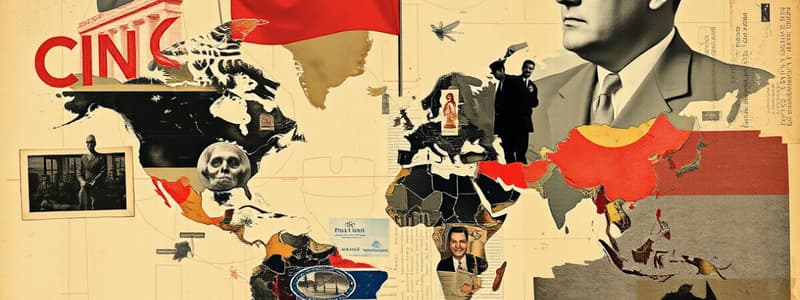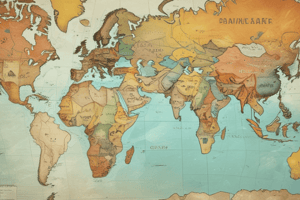Podcast
Questions and Answers
What are the core elements that define a state according to the Montevideo Convention?
What are the core elements that define a state according to the Montevideo Convention?
- Defined Territory, Permanent Population, Effective Government (correct)
- Regular Elections, Defined Territory, National Defense
- Effective Government, Judicial System, Global Recognition
- Permanent Population, Effective Government, Capacity for Trade
What is meant by internal sovereignty?
What is meant by internal sovereignty?
- The capacity to engage in treaties with other states
- The principle of supreme and unquestionable authority within a state (correct)
- The requirement for states to respect each other's borders
- The ability of a state to control its foreign relations
Which model emphasizes the importance of both state and non-state actors in international relations?
Which model emphasizes the importance of both state and non-state actors in international relations?
- Libertarian Model
- Realist Model
- Billiard Ball Model
- Mixed-Actor Model (correct)
What does external sovereignty entail?
What does external sovereignty entail?
Which of the following is NOT considered a non-state actor?
Which of the following is NOT considered a non-state actor?
In the context of international relations, what does state-centrism imply?
In the context of international relations, what does state-centrism imply?
What concept describes the increasing interdependence among states and non-state actors in global affairs?
What concept describes the increasing interdependence among states and non-state actors in global affairs?
Which statement best describes the billiard ball model in international relations?
Which statement best describes the billiard ball model in international relations?
What does the term 'anarchy' refer to in the international system?
What does the term 'anarchy' refer to in the international system?
Which of the following is NOT a form of globalisation?
Which of the following is NOT a form of globalisation?
Which statement best captures the concept of transnationalism?
Which statement best captures the concept of transnationalism?
Global governance is best described as:
Global governance is best described as:
What is a common perspective regarding globalisation?
What is a common perspective regarding globalisation?
Which perspective argues that powerful states manipulate the international system for their advantage?
Which perspective argues that powerful states manipulate the international system for their advantage?
In the context of globalisation, what is one argument of anti-globalisation politics?
In the context of globalisation, what is one argument of anti-globalisation politics?
Which of the following statements reflects a misunderstanding of anarchy in international relations?
Which of the following statements reflects a misunderstanding of anarchy in international relations?
What approach does realism suggest South Africa should take in international relations?
What approach does realism suggest South Africa should take in international relations?
Which philosophical approach emphasizes the need for African contributions to international relations theory?
Which philosophical approach emphasizes the need for African contributions to international relations theory?
What historical context has influenced the development of international relations theories?
What historical context has influenced the development of international relations theories?
Which of the following represents a principle of liberalism in the context of international relations?
Which of the following represents a principle of liberalism in the context of international relations?
What concept is reflected by the term 'Ubuntu' in relation to African philosophies?
What concept is reflected by the term 'Ubuntu' in relation to African philosophies?
What term is used to describe the artificial creation of states during colonization?
What term is used to describe the artificial creation of states during colonization?
What does the concept of 'Pan-Africanism' primarily advocate for?
What does the concept of 'Pan-Africanism' primarily advocate for?
Which of the following is NOT an assumption reflected in the early international relations narratives related to Africa?
Which of the following is NOT an assumption reflected in the early international relations narratives related to Africa?
What does globalism often imply?
What does globalism often imply?
Which of the following is NOT a characteristic of traditional theories?
Which of the following is NOT a characteristic of traditional theories?
What is the main focus of critical theories?
What is the main focus of critical theories?
Which theory suggests that capitalism exploits the global working class?
Which theory suggests that capitalism exploits the global working class?
Which of the following reflects a post-positivist assumption?
Which of the following reflects a post-positivist assumption?
According to liberalism, human nature is viewed as:
According to liberalism, human nature is viewed as:
What is a key argument of postcolonialism?
What is a key argument of postcolonialism?
Which of the following concepts is associated with traditional theories?
Which of the following concepts is associated with traditional theories?
Feminist theory critiques traditional theories for being:
Feminist theory critiques traditional theories for being:
Which aspect is NOT a purpose of critical theories?
Which aspect is NOT a purpose of critical theories?
Study Notes
Introduction to International Relations
- Defines the scope and importance of International Relations (IR) as a discipline.
- Investigates the balance of local (South African) and global political dynamics.
Key Concepts in International Relations
- Distinction between international and global; international refers to relations between states, while global encompasses wider connections beyond state boundaries.
- State-centrism emphasizes states as primary actors in global affairs.
The State and Sovereignty
- According to the Montevideo Convention, a state must possess defined territory, a permanent population, an effective government, and capacity to engage with other states.
- Sovereignty has two dimensions:
- Internal: Supreme authority within the state.
- External: Legal equality among states.
Models of International Relations
- Billiard Ball Model: Positions states as isolated units interacting minimally but critically.
- Mixed-Actor Model: Recognizes both state and non-state actors, including transnational corporations, NGOs, and international organizations.
Interdependence
- Suggests that although states are central, non-state actors impact global interactions significantly.
- Highlights the significance of transnational communities and issues transcending borders.
Understanding Anarchy
- Anarchy in international politics refers to the absence of a higher authority governing states, leading to potential instability but not necessarily chaos.
Globalization
- Globalization represents interconnectedness, with diminishing importance of territorial borders.
- It includes economic, cultural, and political dimensions.
- Debates center on whether globalization is a genuine phenomenon, with anti-globalization movements existing on both ends of the political spectrum.
Perspectives on Global Politics
- Differing viewpoints on the impact of globalization range from advocating for cooperation to emphasizing the division of societies and cultures.
- Concepts such as globalism (inevitability of good) and worlding (diverse worldviews) shape these perspectives.
Theoretical Frameworks in International Relations
- Assumptions and experiences influence perspective and analysis in IR:
- Traditional theories (e.g., liberalism, realism) focus on problem-solving and often reflect Eurocentric views.
- Realism sees human nature as self-serving and emphasizes state-centric power politics.
- Liberalism views human nature as rational, promoting interdependence and peace.
- Critical theories (e.g., Marxism, feminism) challenge traditional assumptions and emphasize marginalized experiences.
- Traditional theories (e.g., liberalism, realism) focus on problem-solving and often reflect Eurocentric views.
Differences in Theoretical Assumptions
- Traditional theories typically uphold a positivist stance, while critical theories are based on post-positivism.
- Critical theories focus on issues like exploitation, colonialism, and gender inequalities in IR.
Applied Theory in Context
- Theoretical perspectives shape responses to global events, such as South Africa's position on the Ukraine war:
- A realist approach may prioritize national interest, while a liberal stance might advocate for human rights and international law.
African Perspectives in International Relations
- Recognizes the development of IR theory alongside colonialism, which often ignores African experiences and philosophies.
- Calls for the incorporation of African narratives into IR theory, emphasizing concepts like Ubuntu and Pan-Africanism.
Conclusion Transition
- The notes set a foundation for exploring the historical context of international relations in subsequent themes.
Studying That Suits You
Use AI to generate personalized quizzes and flashcards to suit your learning preferences.
Related Documents
Description
This quiz covers the foundational elements of International Relations as explored in PTO 101. Key concepts include state-centrism, mixed-actor models, and the distinctions between international and global politics. Dive deep into the essence of what constitutes a state and its role in global affairs.



